Poorest Americans Would Be Hurt By Trump’s Big Bill

Millions of low-income Americans could experience staggering financial losses under the domestic policy package that Republicans advanced through the Senate on Tuesday, which reserves its greatest benefits for the rich while threatening to strip health insurance, food stamps and other aid from the poor.
For many of these families, the loss of critical federal support is likely to negate any improvements they might have seen as a result of slightly lower taxes, experts said. That reality could undercut Republican lawmakers and President Trump, who insisted anew this week that their legislative vision would benefit the entire economy.
The latest evidence arrived in the hours before lawmakers finalized their signature legislation. Studying a since-amended version of the Senate bill, experts at the Budget Lab at Yale, a research center, concluded Monday that it would parcel out its benefits disproportionately.
Americans who comprise the bottom fifth of all earners would see their annual after-tax incomes fall on average by 2.3 percent within the next decade, while those at the top would see about a 2.3 percent boost, according to the analysis, which factors in wages earned and government benefits received.
On average, that translates to about $560 in losses for someone who reports little to no income by 2034, and more than $118,000 in gains for someone making over $3 million, the report found. Martha Gimbel, the co-founder of the budget lab, described the Senate measure as “highly regressive.”
The disparity owes largely to the fact that Republicans aim to pay for their tax cuts by slashing programs for the poor, including Medicaid and food stamps. The cuts amount to one of the largest retrenchments in the federal safety net in a generation. But the savings they generate only offset a fraction of the total cost of the bill, which is expected to add more than $3 trillion to the federal debt by 2034.
Republicans have continued to defend the package as a win for all Americans. On Tuesday, Treasury Secretary Scott Bessent described the bill as a “deal for working people,” saying on Fox News that it would protect Medicaid. Once the legislation passed, Stephen Miran, the chairman of the White House Council of Economic Advisers, heralded it as a boon for economic growth.
But the nonpartisan Congressional Budget Office previously found that nearly 12 million more Americans could become uninsured by 2034 if a recent version of Senate Republicans’ bill were to become law. That includes Medicaid recipients, who could lose benefits because of how Mr. Trump and his party aspire to retool the program’s funding structure.
Democrats repeatedly raised those risks over the course of a marathon, three-day debate ahead of the bill’s passage, as they tried to ward off changes to the federal safety net. But Republicans rebuffed each of those attempts, opting only to shield certain states from the steepest cuts in order to win over holdouts, including Senator Lisa Murkowski, Republican of Alaska.
“How can any senator go home and tell their constituents, ‘I’m sorry, I took away your health care because I wanted to give tax breaks to billionaires’?” Senator Chuck Schumer, Democrat of New York and the minority leader, asked during debate on Monday. He accused Republicans of pursuing policies “ruinous to their own constituents.”
Mr. Trump’s signature package must still win the support of the House, which passed a different version of the bill in late May. In recent days, some increasingly restive conservatives have suggested they are unhappy with the Senate bill and may want it to cut spending even more deeply.
Both the House and Senate measures would preserve a set of tax cuts that Republicans enacted during Mr. Trump’s first term in 2017. Absent that extension, many Americans could see taxes increase next year, a move that the White House has described as an economic calamity. Republican lawmakers also aim to deliver on the president’s 2024 campaign commitments, including his pledge to end taxes on tipped wages and overtime pay.
As a result, most Americans stand to see some form of a tax cut under the Republican plans, but the gains would not be parceled out equally.
A person making $217,000 or more annually would receive about a $12,500 tax cut, on average, under the Senate bill, according to a new analysis released Monday by the Urban-Brookings Tax Policy Center, which did not factor in last-minute changes to the legislation. But a person making $35,000 or less would see only about a $150 average tax cut, the group found.
“People at the very low end might get a tax cut, but their tax cut is relatively small,” said Joseph Rosenberg, a senior fellow at the organization.
The wealthy stand to benefit most from a series of policies in the Senate-passed legislation, including the ability to deduct more of their state and local taxes on their federal returns. Other tax changes, including Mr. Trump’s prized proposal to eliminate taxes on tips, may provide only limited help to workers, some of whom may not make enough money to take advantage of the tax break.
Still, the Tax Policy Center only looked at the Senate’s tweaks to the tax code, not the fuller scope of the legislation, which also includes substantial spending cuts. Factoring in those reductions erases some of the positives and threatens to “tip especially low-income people in the opposite direction,” said Mr. Rosenberg.
Republicans specifically targeted the federal safety net, including the Supplemental Nutrition Assistance Program, better known as food stamps.
On average, SNAP provides monthly payments to about 42 million Americans, according to previous federal estimates. The Senate bill would sharply curtail federal spending on the program by forcing states to assume some of the costs for providing benefits, with the amount determined based on their rate of inaccurate payments. The bill would also require more SNAP beneficiaries to work in exchange for federal aid.
The approach broadly mimics the SNAP cuts approved last month in the House, though Republicans in the Senate on Tuesday relaxed the requirements for some states, as they raced to shore up votes on their package.
Even with the changes, experts said families are at risk of losing their food stamp benefits, echoing the conclusion reached weeks earlier by the Congressional Budget Office.
Studying the House bill, analysts found that work requirements could result in about 3.2 million people losing access to food stamps. They also projected that Republican plans to push the cost of food stamps onto cash-strapped states could prompt state officials to reduce or eliminate benefits for 1.3 million poor Americans. (The office cautioned that the numbers may contain some overlap.)
Gina Plata-Nino, a deputy director at the Food Research and Action Center, a nonprofit that supports anti-hunger programs, said the combination of cuts would translate to “more people going hungry.”
Even for those who retain benefits, their food stamps may see significant cuts. Much like their House counterparts, Senate Republicans adopted new limitations on the way that monthly aid payments are calculated, while curtailing the government’s ability to increase these amounts in the future.
“These provisions are things that will cause some households to have smaller SNAP benefits in the future,” said Dottie Rosenbaum, a senior fellow focused on the program at the Center on Budget and Policy Priorities, a left-leaning group. “It’s not a small number of households.”
Many low-income Americans could face an additional blow from the loss of health insurance coverage, as Senate Republicans look to extract more than $1 trillion in savings from cuts to Medicaid and other health programs.
The Senate bill would establish new, strict work requirements on some Medicaid recipients, while restricting one of the key ways that states finance coverage under the program. The changes are part of a broader set of provisions that may make it harder for Americans to obtain health coverage and qualify for cost-reducing tax credits.
“We take care of Medicaid,” Mr. Trump told reporters on Tuesday.
Before the vote, the Congressional Budget Office offered a more sobering view: Its projections found the cuts combined could leave roughly 11.8 million more Americans uninsured by 2034. The losses exceeded those anticipated under the House-passed version of the legislation, though Mr. Trump said at one point Tuesday that the cuts would be “much less” than predicted.
Mr. Miran, the White House adviser, later maintained that the bill would create jobs, which “brings down the number of people on Medicaid” if they are able to obtain health insurance through their employers.
But the changes sought by Republicans could still carry wide-ranging consequences for the entire health system, potentially causing new financial strains on rural hospitals. Republicans, under pressure from members of their own party, on Tuesday approved $50 billion in new funds meant to offset the impact.
The proposed cuts enraged Democrats and unnerved even some Republicans, including Senator Susan Collins of Maine, who had sought to increase the rural hospital funds. But she ultimately broke with her party and opposed the measure, raising alarm about residents in her state losing access to Medicaid.
“My vote against this bill stems primarily from the harmful impact it will have on Medicaid, affecting low-income families and rural health care providers like our hospitals and nursing homes,” she said in a statement.
The dynamic erupted into public view in the days before the Senate adopted the bill largely on party lines. In a fiery floor speech, Senator Thom Tillis, Republican of North Carolina, said he could not support the package because it would “hurt people.”
Mr. Trump quickly assailed Mr. Tillis, who soon announced he would not seek re-election, reflecting the divisions in the party over its economic agenda.
“These are historic retrenchments in federal spending, and will have pretty historic implications for coverage,” said Robin Rudowitz, director of the Program on Medicaid and the Uninsured at KFF, a nonprofit health policy research group.
What's Your Reaction?
 Like
0
Like
0
 Dislike
0
Dislike
0
 Love
0
Love
0
 Funny
0
Funny
0
 Angry
0
Angry
0
 Sad
0
Sad
0
 Wow
0
Wow
0








































